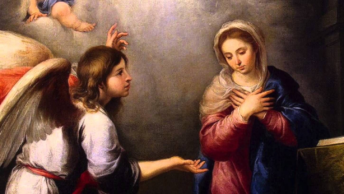On the third Sunday of Advent, we light the pink candle on the Advent wreath. Pink is a milder color, softer than the harshness that some might associate with the color purple. It used to be called “Gaudete Sunday” from the order given and repeated by St. Paul in his Letter to the Philippians (4:4-7): “rejoice, in the Lord always. I shall say it again: rejoice!”
For this reason, I would like to share with you a little reflection on the type of joy, of rejoicing, that St. Paul orders us to have. It seems to me that there are, basically, two types of joy, of fun, of ways of unwinding and celebrating: the type that we can induce ourselves and the spontaneous type that erupts naturally as the result of hard work or of God’s grace.
Examples abound on both sides.The first type we would have to make ourselves to fend off boredom, anxiety, or to break monotony and routine, to look for a good time whenever life gets to be too heavy a burden. Alas, to achieve this type of joy we need external means: alcohol, speed, drugs, pornography, forbidden or risqué situations, loud music, gambling, and things of this sort. I am sure you get the picture. Trouble is, at times the party, the fun never gets off the ground and, whenever it takes off, it doesn’t last nearly long enough. Not only that, but, ironically, afterwards a sense of emptiness, futility, an unpleasant aftertaste or hangover sets in. And worse yet, chances are that we might find ourselves perpetuating a vicious cycle by trying over and over the same silly ways of having a good time.
The second one is the spontaneous type for which we ought to work hard ourselves and/or cooperate with God’s grace. Think of a graduation party after four years of high school, or college. Think of a hard-fought game and victory over the team that kept beating us year after year. Think of a family or class reunion at which reconciliation is reestablished and old friends made anew. Liquor, or drugs or cheap thrills cannot induce the rejoicing that St. Paul orders us to have. It is, rather, the result of hard-earned victories in our discovery of God’s closeness to us in Christ Jesus, and it is the fruit of our success in becoming gradually more caring and more loving. Obviously, the more rejoicing we do in the Lord, the less we need to induce joy and fun ourselves. There is no need of that!
Our readings for this Sunday are samples of rejoicing due to our awareness of God’s presence in our lives:
- The Lord has removed the judgment against you.
- He has turned away your enemies.
- [The Lord] will renew you in his love.
- The Lord is near.
- Make your requests known to God.
Yet, these thoughts underscore some of the ironies of life: up here, at brain level, we know that Jesus the Lord is close to us and that He is all-powerful, all-mighty. Yet, we do not give it much thought for as long as things go well and we enjoy smooth sailing. However, as soon as things begin to deteriorate and we experience anxiety and pain or we are intensely worried, we might or might not allow the thought of Jesus’ presence to bring us inner peace.
Often we might make a timid, short-lived attempt at prayer of deliverance, rather than persevering in prayer with sighs and cries that come straight from the recesses of the heart and do not quit until they get what we need. Too seldom we do reach the point of surrendering to God’s will which, paradoxically, is the surest path to lasting joy.
This pink candle, then, might be urging us to hone our awareness of Jesus’ presence in our hearts and all around us. Joy, in this case, would be the result of sensing His closeness and of believing that every single pain-filled situation is unfolding under the Father’s watchful and loving eye.
There is also the joy that comes from getting close to others with loving care. It is a slow and painstaking process of silencing those urges to think of ourselves first, of making sure that we keep an edge over the rest of people and believe that, since God the Father is protecting and caring for us, we can invest all our energies, skills and time in attending to other people’s needs. It is what St. Francis of Assisi would call the bigger joy (paradoxically again) in giving than in receiving, in pardoning than in being pardoned, in understanding than in being understood, in consoling than in being consoled, in loving than in being loved.
The questions that the crowds, tax collectors, soldiers asked of John the Baptist (Luke 3:10-18) should be understood in this sense: as the first step of moving away from self-centeredness to loving and caring, i.e. the first step to joy.
As believers we should keep in mind that, once again, we are reflecting on genuine rejoicing within the context of the Eucharist. God’s Word invites us to feed at His Table so that we may find always-new ways of rejoicing and may encourage each other to endure many trials in view of that rejoicing in heaven that will never elude us.








